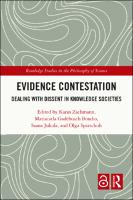Evidence Contestation
Proposal review
Dealing with Dissent in Knowledge Societies
| dc.contributor.editor | Zachmann, Karin | |
| dc.contributor.editor | Gadebusch Bondio, Mariacarla | |
| dc.contributor.editor | Jukola, Saana | |
| dc.contributor.editor | Sparschuh, Olga | |
| dc.date.accessioned | 2023-02-09T14:44:59Z | |
| dc.date.available | 2023-02-09T14:44:59Z | |
| dc.date.issued | 2023 | |
| dc.identifier | OCN: 1344324824 | |
| dc.identifier.uri | https://library.oapen.org/handle/20.500.12657/61217 | |
| dc.description.abstract | This book examines the practices of contesting evidence in democratically constituted knowledge societies. It provides a multifaceted view of the processes and conditions of evidence criticism and how they determine the dynamics of de- and re-stabilization of evidence. Evidence is an essential resource for establishing claims of validity, resolving conflicts, and legitimizing decisions. In recent times, however, evidence is being contested with increasing frequency. Such contestations vary in form and severity – from questioning the interpretation of data or the methodological soundness of studies to accusations of evidence fabrication. The contributors to this volume explore which actors, for what reasons and to what effect, question evidence in fields such as the biological, environmental and health sciences. In addition to actors inside academia, they examine the roles of various other players, including citizen scientists, counter-experts, journalists, patients, consumers and activists. The contributors tackle questions of how disagreements are framed and how they are used to promote vested interests. By drawing on methodological and theoretical approaches from a wide range of fields, this book provides a much-needed perspective on how evidence criticism influences the development and state of knowledge societies and their political condition. Evidence Contestation will appeal to scholars and advanced students working in philosophy of science, epistemology, bioethics, science and technology studies, the history of science and technology and science communication. | en_US |
| dc.language | English | en_US |
| dc.relation.ispartofseries | Routledge Studies in the Philosophy of Science | en_US |
| dc.subject.classification | thema EDItEUR::P Mathematics and Science::PD Science: general issues::PDA Philosophy of science | en_US |
| dc.subject.classification | thema EDItEUR::P Mathematics and Science::PD Science: general issues::PDX History of science | en_US |
| dc.subject.other | citizen science;contestation;contingency;environmentalism;evidence;evidence criticism;Karin Zachmann;knowledge societies;Mariacarla Gadebusch Bondio;Olga Sparschuh;philosophy of science;pseudoscience;Saana Jukola;science & technology studies;scientific expertise;substance use disorders | en_US |
| dc.title | Evidence Contestation | en_US |
| dc.title.alternative | Dealing with Dissent in Knowledge Societies | en_US |
| dc.type | book | |
| oapen.identifier.doi | 10.4324/9781003273509 | en_US |
| oapen.relation.isPublishedBy | 7b3c7b10-5b1e-40b3-860e-c6dd5197f0bb | en_US |
| oapen.relation.isbn | 9781003273509 | en_US |
| oapen.relation.isbn | 9781032226446 | en_US |
| oapen.relation.isbn | 9781032219103 | en_US |
| oapen.imprint | Routledge | en_US |
| oapen.pages | 346 | en_US |
| oapen.remark.public | Funder name: German Research Foundation | |
| peerreview.anonymity | Single-anonymised | |
| peerreview.id | bc80075c-96cc-4740-a9f3-a234bc2598f1 | |
| peerreview.open.review | No | |
| peerreview.publish.responsibility | Publisher | |
| peerreview.review.stage | Pre-publication | |
| peerreview.review.type | Proposal | |
| peerreview.reviewer.type | Internal editor | |
| peerreview.reviewer.type | External peer reviewer | |
| peerreview.title | Proposal review | |
| oapen.review.comments | Taylor & Francis open access titles are reviewed as a minimum at proposal stage by at least two external peer reviewers and an internal editor (additional reviews may be sought and additional content reviewed as required). |

